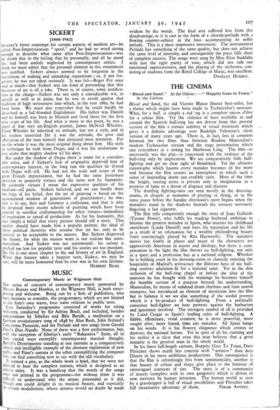[1860-19421 SICKERT'S bitter contempt for certain aspects of modern art—he
called Post-Impressionism " spoof," and he had no word strong enough to describe what came after Post-Impressionism—was no doubt due to the feeling that he -personally, and all he stood for, had been unduly neglected by contemporary critics. I think we must admit that the personal element in this resentment was justified. Sickert always seemed to be forgotten in the excitement of making and unmaking reputations ; or, if not foi- gotten, he was not taken seriously. It was felt—Roger Fry once said as much—that Sickert was too fond of pretending that this business of art is all a joke. There is, of course, some justifica- tion in the charge—Sickert was not only -a considerable wit, in speech as well as in paint, but he was in revolt against that tradition of high seriousness into which, in the year i86o, he had been born. We must also remember that he could hardly be described as a full-blooded Englishman. His father was Danish and he himself was born in Munich and lived there for the first nine years of his life. And what is more to the point, he was a pupil of that very un-English painter, James McNeill Whistler. From Whistler he inherited an attitude, but not a style, and in his restless unsettled life it was the attitude, the pose and affectation of the man himself that attracted most attention. For on the whole it was the most original thing about him His style or technique he took from Degas, and it was his misfortune to rest under that mighty shadow all his days.
But under the shadow of Degas there is room for a consider- able artist, and if Sickert's lack of originality deprived him of contemporary interest, in the long run the qualities he shared with Degas will tell. -He had not the scale and scope of the great French impressionist, but he had the same passionate devotion to painterly virtues and the same zest fo, humanity. By painterly virtues I mean the expressive qualities of his medium—oil paint. Sicken believed, and we can hardly deny the logic of his belief, that the art of painting is based on the accumulated wisdom of generations of practitioners ; he Was, that is to say, first and foremost a craftsman, and that is why he despised more recent schools of painting which have been content to sacrifice craftsmanship for other virtues—immediacy of inspiration or speed of production. As for his humanity, this was simply a belief that every picture should tell a story. This quality should have made him a popular painter, the ideal of those political theorists who assume that art has only to be realistic to be acceptable to the masses. But Sicken disproved the theory, for what the masses want is not realism but send- mentalism. And Sicken was not sentimental : his colour is pitched too low for popular taste and his stories are too mordant. His life is one more chapter in the sad history of art in England. When that history takes a happier turn, Sicken, we may be sure, will be more honoured than he ever was in his own lifetime.
HERBERT READ.


























 Previous page
Previous page